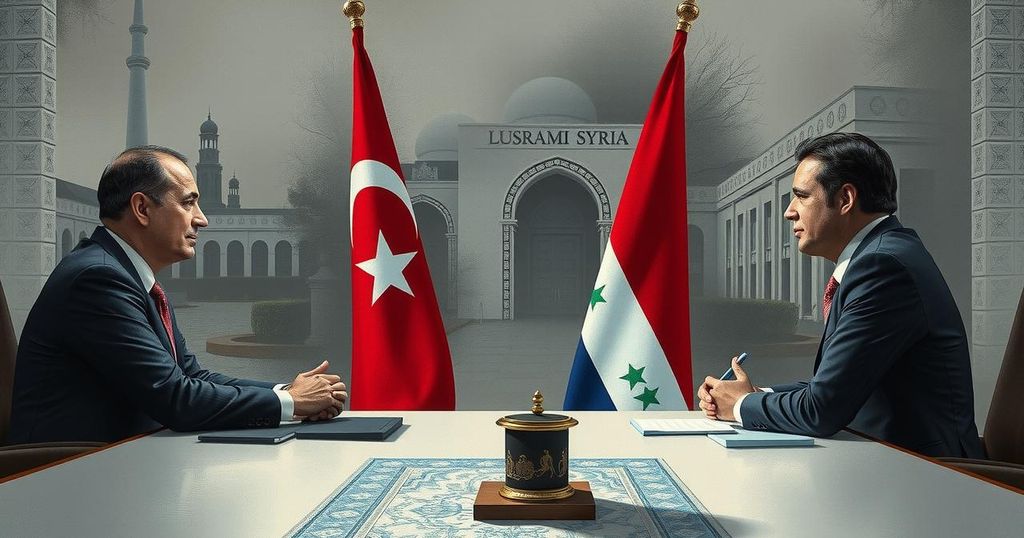Global governments are engaging with Syria’s new interim rulers after the ouster of Bashar al-Assad by Islamist-led rebels. The regime change has prompted optimism among citizens, but complicated relations due to the extremist background of the leading group, Hayat Tahrir Al Sham. International diplomats emphasize the need for justice and accountability as humanitarian needs rise amid the reconstruction of a war-torn nation.
As Syria transitions to a new political landscape following the ouster of President Bashar al-Assad by Islamist-led rebels, global governments are actively initiating contact with the interim authorities. The offensive that culminated in Assad’s removal on December 8, 2024, has prompted celebrations and a sense of liberation within the country. In Damascus University, students expressed a newfound optimism, indicating that fears which once dominated their lives have dissipated. Nonetheless, the swift change leaves many governments reevaluating their strategies.
Despite the victory, the group responsible for the overthrow, Hayat Tahrir Al Sham (HTS), retains its designation as a terrorist organization by several Western governments, complicating international relations. UN envoy Geir Pedersen emphasized the need for a reconciliatory administration while promoting justice and accountability for past crimes. During his visit to Syria, Pedersen met with HTS leaders, urging the establishment of a credible justice system to prevent retaliatory violence.
A Qatari delegation’s arrival in Syria marks renewed diplomatic efforts, as Qatar had historically refrained from re-establishing ties with the Assad regime. Turkey, a significant supporter of the factions that led to the regime change, reopened its embassy in Damascus. Meanwhile, the UK and the US confirmed ongoing diplomatic engagements with HTS despite the group’s controversial status. France is also poised to re-initiate its diplomatic presence with intentions to aid the Syrian population.
The civil war, which instigated Assad’s authoritative rule since 2011, has rather drastically altered the socio-political fabric of Syria. The war is noted to have resulted in an alarming death toll exceeding 500,000 and displacing millions. As the new governance takes shape, former prisoners of the Assad regime revealed appalling conditions, with one man recounting his torment: “Towards the end I just wanted to die, waiting for when they would execute us.”
In the wake of these developments, the humanitarian situation remains precarious. The interim administration faces the daunting challenge of rebuilding a fragmented state following years of destruction. UN envoy Pedersen has called for urgent aid to assist in this rebuilding phase while local officials recognize the necessity of substantial international cooperation.
Reports indicate that despite challenges, a cautious sense of calm is returning, with schools reopening for children in Damascus on their first day back since the regime shift. Although minorities express some reassurances regarding their protection under the new leadership, international observers maintain caution, especially given HTS’s historical roots in extremist ideologies.
Russia has also begun to withdraw some diplomatic personnel as the geopolitical dynamics continue to shift following Assad’s departure. In contrast, Israeli military operations persist in Syria, targeting specific sites amidst concerns of escalating military tensions through the region.
The article discusses the geopolitical shifts following the ousting of President Bashar al-Assad from Syria, primarily focusing on how nations are adjusting their foreign policies in response to the emergence of new interim rulers. The piece highlights reactions from various governments, the societal impact of the regime change, and the humanitarian needs arising from years of conflict. It also sheds light on the challenges faced by the newly formed administration in restoring order and addressing the legacy of decades of political repression.
In conclusion, the ouster of Bashar al-Assad has instigated a profound transformation in Syria, marked by renewed hope among citizens and an influx of international diplomatic efforts. While foreign governments actively seek engagement with the new ruling entities, the challenge lies in ensuring stability and addressing the humanitarian crises stemming from years of war. The international community’s response will be pivotal in shaping Syria’s future trajectory and rebuilding efforts following decades of unrest.
Original Source: jordantimes.com






